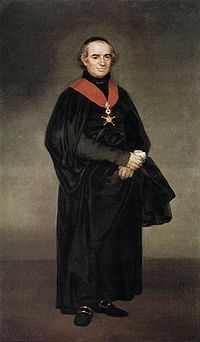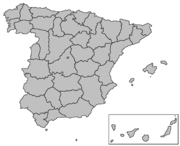
Juan Antonio Llorente
Encyclopedia

– February 5, 1823 in Madrid
Madrid
Madrid is the capital and largest city of Spain. The population of the city is roughly 3.3 million and the entire population of the Madrid metropolitan area is calculated to be 6.271 million. It is the third largest city in the European Union, after London and Berlin, and its metropolitan...
) was a Spanish historian
Historian
A historian is a person who studies and writes about the past and is regarded as an authority on it. Historians are concerned with the continuous, methodical narrative and research of past events as relating to the human race; as well as the study of all history in time. If the individual is...
and liberal
Classical liberalism
Classical liberalism is the philosophy committed to the ideal of limited government, constitutionalism, rule of law, due process, and liberty of individuals including freedom of religion, speech, press, assembly, and free markets....
activist.
He studied at the University of Zaragoza
University of Zaragoza
The University of Zaragoza or sometimes Saragossa University is a university located in Zaragoza, in the Aragon region of Spain...
, and, having been ordained priest, became vicar-general to the bishop of Calahorra in 1782. In 1785, he became commissary of the Holy Office (Inquisition) at Logroño
Logroño
Logroño is a city in northern Spain, on the Ebro River. It is the capital of the autonomous community of La Rioja, formerly known as La Rioja Province.The population of Logroño in 2008 was 153,736 and a metropolitan population of nearly 197,000 inhabitants...
and, in 1789, its general secretary at Madrid.

Peninsular War
The Peninsular War was a war between France and the allied powers of Spain, the United Kingdom, and Portugal for control of the Iberian Peninsula during the Napoleonic Wars. The war began when French and Spanish armies crossed Spain and invaded Portugal in 1807. Then, in 1808, France turned on its...
, Llorente identified himself
Afrancesado
Afrancesado was the term used to denote Spanish and Portuguese partisans of Enlightenment ideas, Liberalism, or the French Revolution, who were supporters of the French occupation of Iberia and of the First French Empire.-Origins:...
with the Bonaparte regime and was engaged for a few years in superintending the execution of the decree for the suppression of the monastic orders, in examining the archives of the Spanish Inquisition
Spanish Inquisition
The Tribunal of the Holy Office of the Inquisition , commonly known as the Spanish Inquisition , was a tribunal established in 1480 by Catholic Monarchs Ferdinand II of Aragon and Isabella I of Castile. It was intended to maintain Catholic orthodoxy in their kingdoms, and to replace the Medieval...
and in arguing for the submission of the Spanish church to the Bonaparte monarch.
His 1810 project for a division of Spain in prefecture
Prefecture
A prefecture is an administrative jurisdiction or subdivision in any of various countries and within some international church structures, and in antiquity a Roman district governed by an appointed prefect.-Antiquity:...
s and subprefectures (under the French revolutionary inspiration) was never brought into practice because of the war.
On the return of King Ferdinand VII to Spain in 1814, he retreated to France
France
The French Republic , The French Republic , The French Republic , (commonly known as France , is a unitary semi-presidential republic in Western Europe with several overseas territories and islands located on other continents and in the Indian, Pacific, and Atlantic oceans. Metropolitan France...
, where he published his great work, Histoire critique de l'Inquisition espagnole (Paris
Paris
Paris is the capital and largest city in France, situated on the river Seine, in northern France, at the heart of the Île-de-France region...
, 1817-1818).
Translated into English, German, Dutch and Italian, it attracted much attention in Europe
Europe
Europe is, by convention, one of the world's seven continents. Comprising the westernmost peninsula of Eurasia, Europe is generally 'divided' from Asia to its east by the watershed divides of the Ural and Caucasus Mountains, the Ural River, the Caspian and Black Seas, and the waterways connecting...
and involved its author in considerable persecution.
After the coup of Rafael de Riego (1820), he supported the new Liberal government.
The discovery of his Carbonari
Carbonari
The Carbonari were groups of secret revolutionary societies founded in early 19th-century Italy. The Italian Carbonari may have further influenced other revolutionary groups in Spain, France, Portugal and possibly Russia. Although their goals often had a patriotic and liberal focus, they lacked a...
an activities and the publication of his Portraits politiques des papes in 1822 culminated in a peremptory order to leave France.
Both the personal character and the literary accuracy of Llorente have been assailed, but, although he was not an exact historian, there is no doubt that he made an honest use of documents relating to the Inquisition which are no longer extant.
The English translation of the Historia (London
London
London is the capital city of :England and the :United Kingdom, the largest metropolitan area in the United Kingdom, and the largest urban zone in the European Union by most measures. Located on the River Thames, London has been a major settlement for two millennia, its history going back to its...
, 1826) is abridged. Llorente also wrote Memorias para la historia de la revolución de España (Paris, 1814-1816), translated into French (Paris, 1815-1819); Noticias históricas de las tres provincias vascongadas (Madrid, 1806-1808); an autobiography, Noticia biográfica (Paris, 1818), and other works.
External links
- Historia crítica de la Inquisición de España, third volume, Madrid, Imprenta del Censor, 1822. Digitized book in Google Books from the Harvard University LibraryHarvard University LibraryThe Harvard University Library system comprises about 90 libraries, with more than 16 million volumes. It is the oldest library system in the United States, the largest academic and the largest private library system in the world...
. - The History of the Inquisition of Spain, from the Time of Its Establishment to the Reign of Ferdinand VII, abridged English translation of the Historia, 1826. Digitized book in Google Books from the University of MichiganUniversity of MichiganThe University of Michigan is a public research university located in Ann Arbor, Michigan in the United States. It is the state's oldest university and the flagship campus of the University of Michigan...
library.

